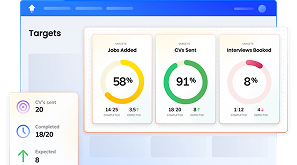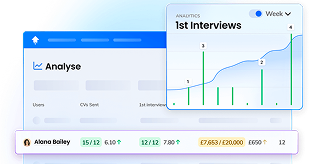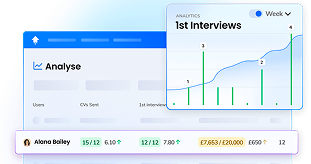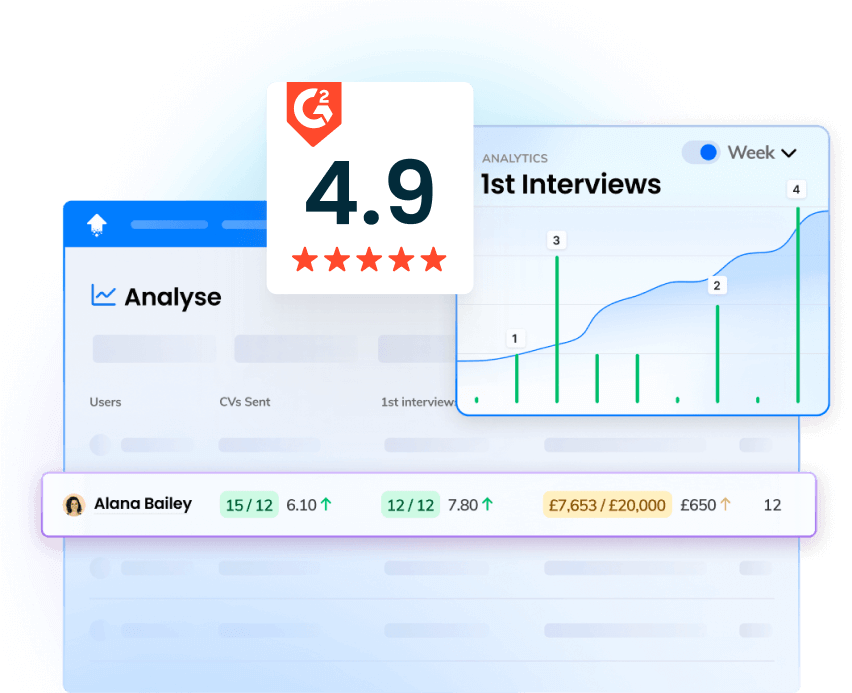Video interviews: coming soon to a recruitment team near you. It’s not surprising given the popularity of the format - video made up 82% of internet traffic in 2022, and it has the highest ROI of all marketing formats.
At OneUp Sales, it is our mission to help recruitment agencies maximise productivity and efficiency, and grow their revenue whilst creating a positive working culture. So how can video interviews help achieve this? Join us as we explore the different types of video interviews that can be utilised in recruitment, and the potential benefits that they can bring.
Since 2019, recruitment has moved online, and job ads have given way to a focus on candidate experience and branding. This has obvious advantages, such as a steady pipeline of candidates, and important efficiency gains as companies look to speed up the hiring process.
If your recruitment consultants are active on social media (and 92% of recruiters are), video content is a logical next step. Here are a few ways video can help you get ahead.

Two-way Video Interviews
Also known as a live interview - much like the traditional phone call, but with eye contact. 60% of companies utilise live video interviews, which are a great way to screen candidates and also avoid the hassle of travelling to a specific location at a designated time.
One-way Video Interviews
Also known as a pre-recorded, asynchronous or solo interview. The candidate records their answers to a short list of screening questions. They’re popular with big recruiters of graduates, including Transport for London and financial institutions.
Video Content
Video is popular with all ages and plays an important part on social networks. Solo interviews, in particular, can lack the human touch – video can restore some balance. Intro videos also provide candidates with important context about who they’re talking to. There’s no need for a highly polished production, but some planning is a good idea.
So, what are the pros and cons of this approach?

A Matter of Efficiency
Video interviews are easy to schedule. In fact, solo interviews don’t have to be scheduled at all. This gives the candidate the freedom to choose a time and place that suits them. And recruiters enjoy shareable recordings, for a more collaborative approach.
Phone interviews take a lot longer than watching solo interviews, too. In fact, interviewers may be able to watch ten interviews in the same time as one phone screening.
Thus, video interviews can increase overall productivity and efficiency for recruitment teams, by giving them the ability to quickly filter through a larger number of candidates earlier on. This means that precious in-person interviews can be reserved in a smaller number for the most suitable candidates.
However, video interviews can feel awkward for candidates. For solo interviews, speaking to a camera lens is particularly unnatural. To avoid this, companies need to proceed with caution.
Start with a warm intro, clear instructions, and a practice run. Clear GDPR policies are of course essential, too. Companies that get the balance right have achieved up to 98% satisfaction ratings from candidates.
The Diversity Question
Do video interviews increase diversity in hiring processes? Get ready for everyone’s favourite answer: it depends.
Will video interviews save enough time to allow you to target a larger number of universities or geographic locations? Then the answer is yes. Can you use recordings to get input from other recruiters? This can offset any unconscious bias in individuals, for a better result.
Candidate Considerations
Love them or hate them, it looks like video interviews are here to stay. And many candidates do hate them. So what can employers do?
- Explain the purpose of the interview. Make it clear that it’s not a replacement for a face-to-face chat, but simply part of your screening process.
- Put candidates at ease with clear instructions and context. Give some guidance on what you’d like to see. There are many specialist platforms that will help you to fine-tune your set-up.
- Ask for feedback and refine your approach over time.
Has Video Killed the Interview Star?

There is no doubt that traditional telephone and face-to-face interviews will remain a core element of the recruitment process for many years to come. Video interviews certainly haven't killed them off - yet, nor do they mean to. They do however, have many useful applications, are growing in popularity, and can form a valuable part of the recruitment toolkit when it comes to filtering through candidates quickly and efficiently to find the most suitable individual.
Like any industry, time is money, and anything that can help recruitment agencies save time and maximise efficiency, can surely only be a good thing?
This brings us to the final question. Video resumes: yay or nay? Let us know what you think.
OneUp Sales - building high performance sales teams by increasing productivity, retaining talent, and empowering management across your organisation. Learn more about our platform and explore what it could do for you.
Photos by Štefan Štefančík, Headway and Seth Doyle on Unsplash
















